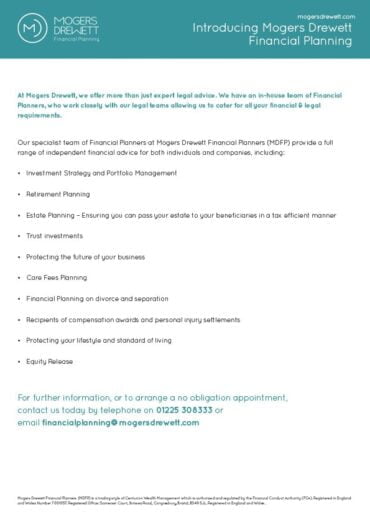Gathering information for financial disclosure
The first step when getting divorce or separating is to pull together all your financial information – this is called “financial disclosure”. This includes details of your income, assets, and liabilities and both parties must do this, and then exchange the information.
Sometimes there may be a temptation to hide incomes and assets and not disclose them. This is not advisable. The courts have wide powers to ensure that there is full financial disclosure, and the consequences of hiding assets can be severe.
The law sets out a framework for the division of incomes and assets on divorce and so having one set of figures that both parties and their representatives can work from, means there is a far better chance of a speedier – and fairer – resolution.
Matters can become complicated where one party has a trust, or a significantly larger pension scheme than the other or if the division of savings and investments results in penalty charges or tax implications and so financial advice is recommended.
Our team of experts can assist in gathering your financial information and by explaining the framework and what the court is likely to see as fair and reasonable to both parties.
Next steps: get in touch
This can be done formally or informally, in mediation, through collaborative law or through divorce lawyers negotiating on your behalf and so if you require guidance and support on how to collate your financial information, contact our expert team on: 01225 308333 or financialplanning@mogersdrewett.com
Meet the team
Frequently asked questions
Financial disclosure is the process where you collect and exchange all your financial information with you partner. Financial details include of your income, assets, and liabilities such as properties, credit card debts and pensions.
The consequences of hiding assets can be severe: Whatever settlement was reached without full disclosure may be set aside and if an individual is found to have been deliberately untruthful there may be criminal liability for fraud.
If you refuse to provide financial disclosure as part of the financial court process the court can make orders against you requiring financial disclosure. You will be in contempt of court if you breach the order
Forensic accounting can often uncover hidden income. Your attorney may be able to subpoena your ex-spouse’s tax returns, credit card records, bank statements and other financial records to prove that his or her expenses exceed the amount of income he or she is claiming
The Full Court found that there is no legal obligation for a party’s new spouse or partner to provide disclosure documents as the Court rules do not extend the disclosure obligation to the parties’ new partners






